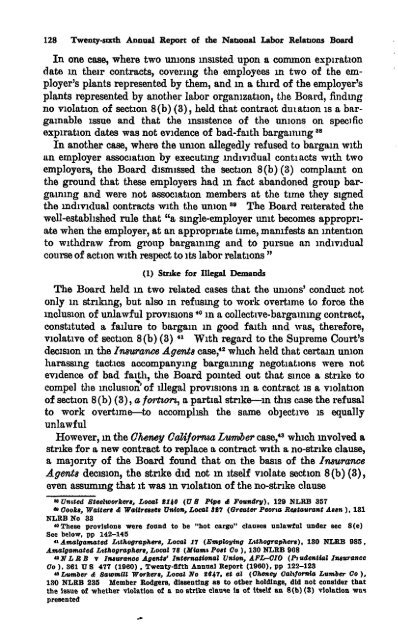TWENTY-SIXTH ANNUAL REPORT - National Labor Relations Board
TWENTY-SIXTH ANNUAL REPORT - National Labor Relations Board
TWENTY-SIXTH ANNUAL REPORT - National Labor Relations Board
You also want an ePaper? Increase the reach of your titles
YUMPU automatically turns print PDFs into web optimized ePapers that Google loves.
128 Twenty-sixth Annual Report of the <strong>National</strong> <strong>Labor</strong> <strong>Relations</strong> <strong>Board</strong><br />
In one case, where two unions insisted upon a common expiration<br />
date in their contracts, covering the employees in two of the employer's<br />
plants represented by them, and in a third of the employer's<br />
plants represented by another labor organization, the <strong>Board</strong>, finding<br />
no violation of section 8(b) (3), held that contract dui ation is a bargainable<br />
issue and that the insistence of the unions on specific<br />
expiration dates was not evidence of bad-faith bargaining 88<br />
In another case, where the union allegedly refused to bargain with<br />
an employer association by executing individual conti acts with two<br />
employers, the <strong>Board</strong> dismissed the section 8(b) (3) complaint on<br />
the ground that these employers had in fact abandoned group bargaining<br />
and were not association members at the time they signed<br />
the individual contracts with the union 89 The <strong>Board</strong> reiterated the<br />
well-established rule that "a single-employer unit becomes appropriate<br />
when the employer, at an appropriate time, manifests an intention<br />
to withdraw from group bargaining and to pursue an individual<br />
course of action with respect to its labor relations"<br />
(1) Strike for Illegal Demands<br />
The <strong>Board</strong> held in two related cases that the unions' conduct not<br />
only in striking, but also in refusing to work overtime to force the<br />
inclusion of unlawful provisions 4° in a collective-bargaining contract,<br />
constituted a failure to bargain in good faith and was, therefore,<br />
violative of section 8(b) (3) 41 With regard to the Supreme Court's<br />
decision m the insurance Agents case," which held that certain union<br />
harassing tactics accompanying bargaining negotiations were not<br />
evidence of bad faith, the <strong>Board</strong> pointed out that since a strike to<br />
compel the inclusiori of illegal provisions in a contract is a violation<br />
of section 8(b) (3), a fortiori, a partial strike—in this case the refusal<br />
to work overtime—to accomplish the same objective is equally<br />
unlawful<br />
However, m the Cheney California Lumber case," which involved a<br />
strike for a new contract to replace a contract with a no-strike clause,<br />
a majority of the <strong>Board</strong> found that on the basis of the Insurance<br />
Agents decision, the strike did not in itself violate section 8(b) (3),<br />
even assuming that it was m violation of the no-strike clause<br />
38 United Steelworker8, Local 2140 (U S Pipe d Foundry), 129 NLRB 357<br />
89 Cooks, Wait ere 6 Waitresses Union, Local 827 (Greater Peoria Restaurant Assn ), 131<br />
NLRB No 33<br />
40 These provisions were found to be "hot cargo" clauses unlawful under sec 8(e)<br />
See below, pp 142-145<br />
Amalgamated Lithographers, Local 17 (Employing Lithographers), 130 NLRB 985,<br />
Amalgamated Lithographers, Local 78 (Miami Po8t Co ), 130 NLRB 968<br />
o NLRB v Insurance Agents' International Union, AFL—CIO (Pt udential Insurance<br />
Go), 361 US 477 (1980) , Twenty-fifth Annual Report (1960), pp 122-123<br />
da Lumber d Sawmill Workers, Local No 2647, et al (Oheney California Lumber Go ),<br />
130 NLRB 235 Member Rodgers, dissenting as to other holdings, did not consider that<br />
the issue of whether violation of a no strike claim is of itself an 8(b) (3) violation was<br />
presented

















